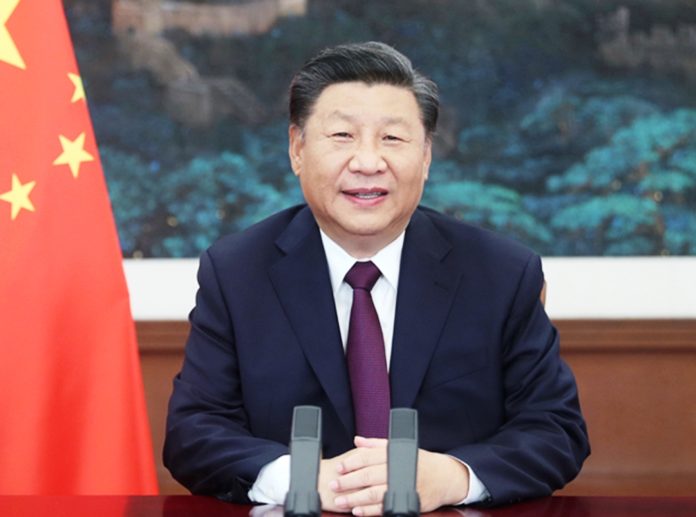Chinese President Xi Jinping on Friday (September 4) expressed his support in setting up a pilot Free Trade Zone in the capital Beijing.
The leader of the world’s second-largest economy said China’s central government will support the capital in creating a zone that would characterize scientific and technological innovation and opening up of the services sector and the digital economy.
Xi’s decision was announced at the opening of the 2020 China International Fair for Trade in Services (CIFTIS) held online and onsite in Beijing on Friday, September 4.
“We will support the municipality in developing a national integrated demonstration zone for greater openness in the services sector. It will enable Beijing to take bigger, bolder steps as a trailblazer and gain more experience that would be replicable and scalable,” Xi said during a video address at the CIFTIS Global Trade in Services Summit .
The new Beijing free trade zone will serve as a platform of high-standard opening-up for the coordinated development of the Beijing-Tianjin-Hebei region, and open up new horizons for reform and opening-up at a higher level, Xi added.
“We will continue to work on a negative list system for managing cross-border services trade,” he said.
China’s pilot free trade zones attracted robust foreign investment and trade in the two quarters despite a downcast sentiment in the global market, official data reported by state-run news agency Xinhua showed on Wednesday (September 2).
The six initial pilot FTZs in the region are Shandong, Jiangsu, Guangxi, Hebei, Yunnan and Heilongjiang, as well as Shanghai’s Lingang Area, a newly launched section of the Shanghai FTZ which attracted 13.11 billion yuan ($1.9 billion) of foreign investment during the January-July period, Tang Wenhong, an official from the Ministry of Commerce said.
Foreign trade in those FTZs came in at 660.76 billion yuan ($96.56 billion) in the seven-month period, accounting for 10.8 percent of the total Chinese foreign trade in the regions.
The pilot FTZs have also played a positive role in stabilizing foreign trade and investment amid the sluggish international market, Tang said.
CIFTIS is the first major international economic and trade event held both online and offline by China since the COVID-19 outbreak.
Free Trade Zone fosters open, inclusive environment for cooperation
In his speech reported by state-run broadcaster CGTN, Xi called for joint efforts to foster an open and inclusive environment for cooperation, saying the world is going through profound shifts unseen in a century and the COVID-19 pandemic is accelerating such changes.
The Chinese president said the services sector is unique as it is asset-light but heavy in soft factors of production.
“As such, it requires, more than other sectors, an open, transparent, inclusive and non-discriminatory environment for businesses to grow,” he stressed, calling for concerted efforts from all countries to reduce border and behind-the-border barriers constraining the flow of production factors and promote cross-border connectivity.”
The president said the country needs to adapt to the trend towards digital-driven, internet-based, and smart growth, jointly eliminate the ‘digital divide,’ and advance digitalization of trade in services
“China will continue to build bases for featured services export and develop new business forms and models in services trade. China will work with other countries to enhance macro-policy coordination, accelerate international cooperation in the digital sector, step up intellectual property protection, and facilitate the vibrant growth of the digital economy and sharing economy,” Xi added, noting that such efforts will generate renewed dynamism for the world economy.
The statement comes amid a continuing trade war with the US, currently the world’s largest economy, as Washington continues to block U.S. companies from trading with Chinese tech companies whom President Donald Trump accuses to have been threatening the country’s national security.
Mr. Trump on Friday said that “China is more of a threat” to the United States than Russia. Trump told reporters his reactions to the alleged poisoning of top Russian opposition leader Alexei Navalny.
“It is interesting that everybody’s always mentioning Russia … but I think probably China at this point is a nation that you should be talking about much more so than Russia,” Trump said.
Meanwhile, President Xi also stressed the importance of promoting mutually beneficial cooperation, saying that to treat each other with sincerity and pursue shared benefits is the key to state-to-state relations in today’s world.
“Countries need to forge greater synergy in growing their trade in services, seek new ways and more areas of cooperation, and look for the widest possible converging interests in development so as to make the ‘pie’ bigger and bigger.”
China will use CIFTIS and other platforms, such as the China International Import Expo, to promote policy exchange and experience-sharing, and foster diverse partnerships with foreign governments, international organizations, business associations, and enterprises.
Read More: Netflix Signs Mega Deal with Prince Harry, Meghan Markle



